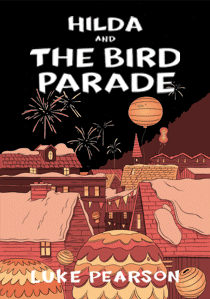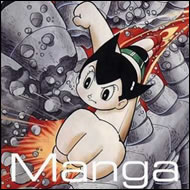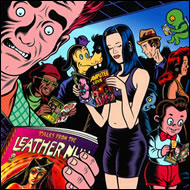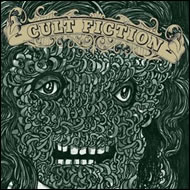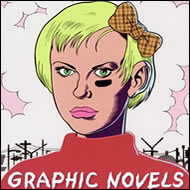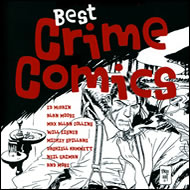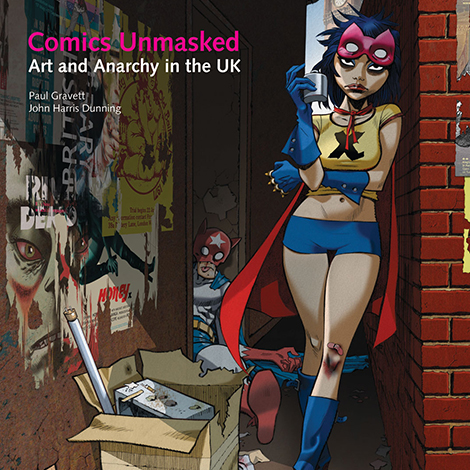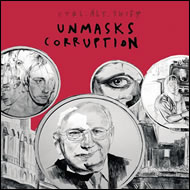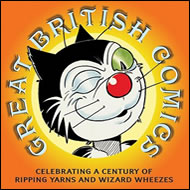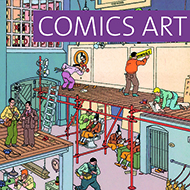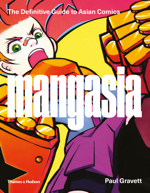Alan Moore:
The 'Lost' Interview
On 1st January 2008 Alan Moore and Melinda Gebbie’s Lost Girls will be officially distributed in the UK and EU by the publisher, Top Shelf, for the first time. Described by Neil Gaiman as "...remarkable, as good as anything Moore has done in his career", Lost Girls has provoked controversy not only for its subject matter (pornography) but also for its radical reinterpretation of characters from Alice’s Adventures In Wonderland, Peter Pan and The Wizard Of Oz. On July 1st 2006, Paul Gravett interviewed Alan Moore in Northampton to discuss Lost Girls. That interview formed the basis of articles which originally appeared in The Independent On Sunday newspaper and Dazed & Confused magazine. Their full conversation is presented below for the first time.

Paul Gravett:
In The Sadean Woman Angela Carter saw the potential, and the need, for "enriching pornography", not two words you normally associate with each other. What are your thoughts on the role and potential of porn?
Alan Moore:
Angela Carter’s book did give us some formative thoughts on the matter. She ended the book by suggesting that even though most pornography was disappointing, if not offensive, she could imagine a form of pornography that would be healthy in a cultural sense and enriching and do all of the things that art was capable of doing but in a pornographic context. Simone de Beauvoir in Must We Burn De Sade? makes a similar argument and I believe even Andrea Dworkin, before she died, had at least accepted the hypothetical possibility of a form of pornography that she would see as benevolent.
So pornography is not necessarily an irredeemable genre?
No, apparently not. And the reason I chose the word pornography originally was out of perversity and being a smart arse, initially, in that I thought the term pornography more or less depended on the income bracket of the reader. Sophisticates could tell themselves that they were reading erotica, whereas ordinary people would be making do with porn. So, as an egalitarian gesture, I decided to call Lost Girls pornography. Also because if we did a good enough job on it. then to a degree that would redeem the term pornography. Also because in actual terms of what pornography meant, it was a better description of what we were trying to do than erotica.

In what way?
In that erotica is purely pertaining to love. Now admittedly that is generally interpreted as sexual love, but I don’t see that love generally enter the picture, when what we’re talking about is sexual arousal. This is not to say that sex with love is not infinitely better than sex without love, but sometimes sex is just about pleasure and physical gratification. So we decided that, rather than claim that this is a love story, the definition of pornography as drawings or writings of wantons was a much better description of what we wanted to do.
Recently, I’ve realised that it’s the perfect word, because drawings or writings of wantons does not include polaroid photos, or home video footage or shared files of wantons, which is a different issue entirely. We are talking with Lost Girls entirely about the realm of the mind, the realm that pornography has always traditionally dealt with, in the means of novels and illustrations from the arguable golden age of the Victorian period.
How do you view our society’s relationship with pornography today?
It seems to me that our society is absolutely saturated with pornography, in everything from our television advertisements to our PC games, we have a stream of imagery that, whatever it is intended to sell, cannot help but end up greatly sexualising the entire society. Added to that you’ve got the internet which I believe is 75 per cent used for the viewing and downloading of pornography, so it’s good to see that that’s lived up to its potential. So, although it’s not acknowledged, we have a society which is entirely sexualised and yet its relationship with its sexual imagination is a really strange and unhealthy one, in that it tries to pretend it doesn’t have a sexual imagination or that having one is in some way shameful, sinful, guilt-inducing. Which means that the way in which the sexual imagination works in our culture is as a kind of multi-purpose social control leash.
It’s a stick and a carrot combined, that for the purposes of commerce it can flood your mind with the most licentious ideas and imagery but woe betide anybody who actually finds themselves in this inflamed state and responds. Because then they are a dirty, filthy person who responds to pornography. So that is when the stick comes into effect to make everybody feel guilty and ashamed for whatever kind of sexual gratification they have been driven to by the burgeoning sexual aura of the culture that we are in.
One of the reasons why we wanted to do Lost Girls was that we wanted to come up with a form of pornography that actually transcended what pornography was supposed to be about, a kind of pornography that had got artistic and literary values, that were so high, that there need not be that sense of guilt and shame accompanying the reading of it. If we could create a work of sufficient worth and sensitivity, it might begin to redefine pornography as a kind of beautiful, safe arena in which our sexual ideas could be openly discussed. Because I feel that leads to a healthier society. When I look at reports about countries such as Holland, Denmark or Spain, where they have a very lax attitude to pornography and it is readily available from almost every family newsagents, and where nobody really notices it anymore. In all these countries, although you do have widespread, hardcore pornography, you do not have anywhere near the degree of actual sex crimes, particularly against children that we "enjoy" in this country and in the USA.
You could be forgiven for getting the impression from this that pornography and a healthy relationship with the erotic might actually be a very important sexual pressure valve within society that needs to be there. If you look back to our primordial past it seems we have had visual and presumably verbal representations of pornography since the Venus of Willendorf. It also looks likely that until we have come to the end of our stay upon this planet, whether that’s next Tuesday or in ten thousand years time, we will probably have some form of pornography accompanying us.
So the only question seems to be is it going to be good, constructive, healthy pornography, or something else? Are we going to put up with the same basically ugly kind of material that we have at present. There isn’t any reason why pornography should not be a thing of beauty, which would perhaps make us feel better about our own sexual imaginations. If we were looking at something beautiful, we might think that our sexual imagination was beautiful. If we’re looking at something that by its very nature is sordid, ugly and depressing, then we’re likely to come away with the impression that our sexual imagination is the same.

Back in 1988, in Escape Magazine, you wrote an editorial piece for me entitled No More Sex in which you said, "Consenting sex cannot be prevented and there’s regrettably little evidence that even Un-consenting sex can be curtailed by legislation alone. Perhaps desire is better comprehended than contained? Perhaps sexual openness would mean less morbid longings festering alone in the darkness?"
That is exactly how I feel today. In the context of that Escape editorial, where we were talking about AIDS, I also probably said that AIDS would probably decimate us before it was done. And the figures suggest that it is well on the way to doing that. One thing that might conceivably be "helpful" in an AIDS epidemic, or pandemic, would be presumably a higher standard of pornography with human values. You cannot get much safer sex than pornography.
Might this include virtual pornography?
I’d point out that all pornography is virtual. A book is virtual reality. It is still in fact the most convincing "Sensurround" form of virtual reality that we have. If you simply reading a text, especially one illuminated with pictures, then you are in that world because you are creating it, the characters’ voices, the mood and atmosphere, as you go along. It’s a very intimate experience. I suggest that yes, maybe someday they may be able to come up with some form of virtual experience that will drop you in the middle of the Napoleonic Wars so you’ll be able to hear the cannons going off and the horses whinnying and it may be just like actually being there. But I think you’d still learn an awful lot more if you just read War and Peace, which is a virtual experience with much greater detail and guided by a mind that know what it wants to tell you.
But certainly, in that any form of pornography, at least as we’re talking about it, is a virtual experience, you’d think that could be seen as quite forward-looking, given the state of sex in our society at present.

You and Melinda must have discussed how frank and explicit to make Lost Girls, and how to make it arousing without being clichéd or sensationalist. What were those discussions like?
There were an awful lot of complex discussions between me and Melinda over the sixteen years that it’s taken us to put the book together. Every aspect of it was discussed over and over again. Some of the scenes, perhaps at the beginning of the book, when we were thinking of things that would be coming up later, we wondered if they might be too strong or might cross some aesthetic line. But as we progressed with the book and especially as I saw how Melinda’s art was working out, in that it seemed to be able to imbue even the most potentially grotesque scene with a kind of charm, beauty, warmth and a sensual, human atmosphere that made it into something different. There was that inevitable balancing act in both the pictures and the words, probably more in the words, between how do you make this arousing and artistic at the same time? If people are appreciating it artistically, isn’t there a danger that they won’t be appreciating it erotically? If we’ve got it right for even a few of the readers, that will be pretty good. I think it would be impossible to strike that balance exactly for the whole of the readership. In a very good review that Neil Gaiman gave to Lost Girls in Publishers’ Weekly, he said that for his own tastes, it was perhaps a bit too strange and heady for him to respond to on a visceral level. But as he acknowledged, pornography is one of those things that is very much a matter of personal taste. We hope we’ve been as universal as possible. We tried to find something personally arousing in every scene, otherwise that would have been faking it to a degree. In the same way that when I’m writing a comedy scene, I like to actually laugh at it. Or if I’m writing a tragic and moving scene, I like to have tears in my eyes while I’m doing it. So, we had to be responding ourselves to the material in Lost Girls, but at the same time we didn’t want it just to be a mirror of our sexual tastes. We wanted to create something potentially appealing to people of whatever gender or sexuality.
You made a point of covering quite a spectrum.
As Tennessee Williams once said, "I think we’ve covered the waterfront"! There are areas we’ve ignored, I know there are people who like to dress up as furry cartoon characters, and there’s not an awful lot of that in Lost Girls, but they can do their own book!

Why did you choose to set the book in 1913?
Actually, the date kind of chose us. As soon as we had come up with the idea of using Alice, Dorothy and Wendy as the three Lost Girls, our first act was to mock up a rough timeline for each character. We worked on the basic assumption that the adventures they talk about in the books could not have happened after the books were published. So working from there, we got this set-up where the three women were very different ages. Alice is the oldest, Dorothy the youngest and Wendy somewhere inbetween. And as we wanted them all to be sexually active in this book, that gave us only a fairly narrow window before Alice would be too old. She’s a sixty-something here. Or conversely where Dorothy would be too young. And we found out that according to our rough dating system, this worked out as a two or three year window around 1913 and 1914. Those dates are obviously very resonant. We began to see that this could provide a really powerful raison d’etre for the whole work. Because one of the things this book needed if it was going to be what we wanted it to be, a pornography that was also a work of art and literature, was a meaning, some grand theme. We began to see that setting it against the backdrop of a kind of ominously building political situation that is going to erupt into the First World War would provide a really stark contrast with the soft human activity that we were foregrounding. And it would perhaps make some powerful statements about both the human imagination in its sexual phase and also the absolute lack of imagination that is represented by war. War is what destroys all the great works of the imagination, all the culture, and all of the young men and women when they are at their prettiest, their sexiest, their liveliest and they are scythed down in these periodic episodes. It struck me that there is a sharp and sour contrast between our sexual imagination as expressed in our pornography, in what we long for, and what we actually get, which are these incessant international conflicts that kill us in our thousands or millions.
And then the performance by Stravinsky of Le Sacré de Printemps, the opening night at the Paris Opera, we found that had occurred within about 12 months of the assassination of Franz Ferdinand, then that struck us as a very important juxtaposition. We thought it would be a really dramatic way of ending the first of the three volumes and foreshadowing the kind of primal violence that was going to erupt in Europe in the later volumes. But as we’re getting to the point where Lost Girls is going to be published, and we’ve had the odd bit of rumblings from people who sense it as controversial, it strikes me that accidentally the reference to The Rite of Spring and the attendant riots might have an oddly prophetic ring about it. I’m not suggesting for a moment that what we have done is of the same calibre as what Stravinsky, Diaghilev and Nijinsky and the rest did back then, but we’re dealing with the same subject matter, sex and death, primal themes and delivering this work into an overwrought society that is already in the throes of a war potentially more damaging and longer lasting than the war we were approaching at the beginning of the 20th century.
It does raise the question of what are people going to be offended at in the book - the sex you have shown them or the horrors of war.
Yes, there’s a juxtaposition in the last chapter with a great big dildo that is resting upon a dressing table in the foreground of one of the opening shots of the episode, and by the end, where we are pulling over the fields of the First World War, there’s a human penis outside the context of an attached body which mirrors it but in an appalling way. You start to think, which of these is obscene? With the various moral panics that race through our society, that lead to pediatricians being driven from their homes by enraged lynch mobs, if people could get a little bit less upset by imaginary acts on paper, and a little bit more upset with the scenes that they are seeing on their televisions almost every night of real, flesh-and-blood children being mutilated, killed, bereaved, driven out of their minds, then that would perhaps be a more proportionate and measured response to the kind of society that we’re living in. If we get outraged about something, let’s make sure we get outraged about the right thing. Let’s make sure that we’re not getting outraged about what somebody likes to imagine sexually, because what happens in the world of the imagination has no direct repercussions in the world of material events. When you have actual real children really being hurt in a war that our country apparently supports, so it is being fought in our name, then that would seem to be something worth getting incensed over. Next to that, things that happen inside people’s heads are of no consequence.

The inevitable devil’s advocate question here is that not everybody keeps those things inside their heads.
That is suggesting that there is a link between pornography and actual incidents of sexual crime. Yet the evidence seems to suggest that the opposite is true. I remember we were on BBC Radio 4 Today programme recently, and the first question that was put to us was "How would we feel if even one paedophile was moved to attack a child by reading Lost Girls?" I restrained myself from asking how the interviewer would feel if even one Ministry of Defence bio-weapons expert was found dead in the woods after being outed on the Today programme, because that would have been impolitic. But I suggested that my main feeling, should such an event occur, would be one of enormous surprise because, as far as I understand it, when it comes to sexual criminals of any kind, whether rapists or paedophiles, it’s obvious that if pornography was doing it for them, they wouldn’t need to carry out these dreadful crimes. They are guided and inspired by their own pathology, they are certainly not inspired by ridiculously expensive and literary art books. They are more likely to responding to the general rise in sexual temperature in the whole culture.
I believe Joan Bakewell was doing a piece the other day bemoaning the way in which clothing manufacturers are sexualising young children in this country. Of course, the children want to dress like that because they want to be grown up, all children do. But while we don’t talk about what this, about what say The Spice Girls do to the average self-image of a ten-year-old. Or Britney Spears, why was that schoolgirl video she did so popular? Why is Barely Legal such a popular magazine? It would suggest from the incidences of actual child rape and murder and whole variety of other sexual crimes, that have nothing at all to do with children, but are every bit as terrible. I know we have sentimentalised the idea of childhood since Victorian times, but people seem to get a lot more upset about the idea of this innocent ideal of childhood that we’ve projected being harmed or tarnished in some way than they do about say the old woman in her eighties who was raped and murdered just across the road here in Northampton a while back. Or the number of elderly women raped by the still-at-large south London rapist. Now these people are as powerless and frightened as any child. There is a danger by hysterically fixating upon the current social bogeyman of child abuse that we lose sight of the fact that any non-consensual act is wrong. It doesn’t even matter if it’s a sexual act or not. Anything done under coercion, at least by my books as an anarchist, is wrong, and I would hope by almost anybody’s standards.
We seem to have a problem accepting that children, or young people, are sexual beings.
That makes us uncomfortable as well, even though most of us, if we were honest, would admit to having had blurred sexual thoughts at a ridiculously early age. You can’t even suggest that because that is as good as saying, Oh well the children were asking for it. It’s seen as an apologia for paedophiles which means that the issue cannot be raised without raising hysterical suspicion. I submit that as with the recent tabloid-led initiative to establish an equivalent of the American Megan’s law over here, which most campaigners says will have the effect of driving sex offenders underground, we have these kneejerk responses which are not really in the best interests of the people whom we claim to trying to protect.
How do you feel our society should be dealing with these issues?
How the authorities are dealing with it is to arrest large numbers of people, very publicly, for visiting dodgy pornographic sites on the internet. Now there are a whole lot of ethical questions about looking at photographs of kids or whatever, and I’m not trying to negate any of those ethical questions, because to a degree you are contributing after the fact to the abuse, which is photographing the child in the first place. Again, the age of consent varies from decade to decade and country to county. But all these arrests give the public the impression that the authorities are doing something to keep children safe. But the authorities know that the much greater dangers to children are things like file-sharing where you have the most horrific circumstances going on and there is nothing the police can do about it because it’s not as detectable as some sad man logging onto a jailbait website. So it’s largely cosmetic, what we are doing about this problem.
But I would suggest that if we were to have a look at pornography which is surely one of the most pervasive genres in our culture, if it could be made into something that was healthier, better, stronger than it is at present, then I feel that could provide a really wonderful forum in which these ideas could be brought to light as ideas, so that people wouldn’t cross that dangerously blurred line between the fantasy and the actuality. The difference is evident to most normal people and most children. It’s only with sex that we seem to get confused about this. When I produced From Hell, I never had one interview question asking me how I’d feel if even one religiously-themed maniac went out and eviscerated prostitutes in London’s East End. Nobody thought there was any danger of that. It’s a different set of standards that we apply to everything that isn’t related to sex. I think this is because we just too embarrassed to talk about it. We don’t mind watching or reading pornography in the privacy of our own lifepod but we don’t want to talk about it or acknowledge it. That is a dangerous state for a culture to be in, when it is in denial about some of its most powerful urges, there may not be any way to stop those urges breaking out disastrously.
In terms of creating enriching pornography, are there any people you look to now, in film, writing, comics?
To tell the truth, neither me nor Melinda know very much about contemporary pornography. We’re not on the internet, so personally I can appreciate some of the great erotic photographers, though I don’t find their stuff particularly sexy. I think my tastes are very limited in pornography, I tend to only like writing or drawing of wantons. If you’re talking about pin-up photographs or movies, the fact that these are real human beings you’re seeing beings an unwelcome emotional baggage to everything, You’re having to feel a bit sorry for the actors and actresses concerned and thinking that that’s probably not much of a life. It’s probably not what they or their parents foresaw as a career for them. Those issues intrude on any potentially arousing side to the deal. For me, it’s those Taschen collections of erotic art, and a very few paperbacks, mostly from the Victorian period, from the 1890s. There are one or two noble exceptions, but nothing much since 1970 or thereabouts. The state of pornography is pretty grim. Of course, there are still giants like Robert Crumb, who has always had a really healthy, direct, honest relationship with his own sexual imagination and who has been rightly applauded for sticking to his guns.
What do you think of the pornographic comics by Italian artists Guido Crepax or Milo Manara?
I am not huge on Crepax, there is something a bit necrotic and gaunt and skeletal about his women. That’s just a matter of taste, though I’m not too convinced by his storytelling, more than by the looks of his women. I think his art is perfectly good, but he doesn’t really do it for me. Manara, again he’s a fine draughtsman, but all of his women have the same blow-job mouth that puts me off, it’s characterless. Which is the exact opposite of what we’ve tried to do with Lost Girls. We’ve tried to make these people into people first, and sexual crash dummies second. There are some very good European artists whose work I’d admire if it was single images or short sequences in Glamour Magazine, that would occasionally be good, but I’d sometimes find that, if I read those pieces in translation, they would be limited by their excessive retreading of the artist’s own particular narrow band of sexual fantasy interests.
Did you think that American graphic novels like Omaha the Cat Dancer or Doll achieved anything as comics pornography?
I thought Omaha was an interesting idea and Reed Waller and Kate Worley did a tremendous job on it. Perhaps, like I say, it’s a difficult balancing act between making something pornographic and giving it a real narrative and for my personal taste, perhaps in some of the later run of Omaha, it became too focussed on the narrative and the characters to the detriment of the erotic content. With Doll, I thought there was something genuinely interesting there. Guy Colwell has done some excellent short erotic pieces way back in the 1970s in Inner City Romance (five issues, 1972-8). I did enjoy Doll because it was thoughtful and it has a well-told quality to it, the way he used this completely lifeless mannequin which ended up having more personality that most of the other characters in the strip. There have been some really nice little pieces, but there have been very few that have had any real ambition. When you think of what a huge flood of pornography is produced in comics month after month. I have seen the adults-only catalogue issued monthly by Diamond Comics Distributors and the amount of stuff that’s produced is very disappointing to think that there never has been anything with the ambition of Lost Girls before. I suppose the fact that it took me and Melinda sixteen years might answer that question.
Maybe Lost Girls will do for pornographic comics what your Watchmen with Dave Gibbons did for superhero comics? As a kind of wake-up call to show that this genre is not dead or stultified, it has enormous potential.
Please don’t say that! It would result in just imitations of Lost Girls that would be as pallid and missing the point as all the imitations of Watchmen were. And I don’t think the superhero genre, 20 years after Watchmen, has got an awful lot to recommend it in the present day. I don’t know what we expect to happen post-Lost Girls. The fact that it does take such an incredible amount of dedication and energy to draw or write something like this suggests that there won’t be an awful lot of people attempting it.
Yes, but maybe like Maus, in another 10 or 15 years, other people will have seen Lost Girls as a beacon and think they can do something meaningful of their own?
Perhaps, yes. As we were talking earlier about Angela Carter and Simone de Beauvoir, and the way they came up with the idea of a hypothetical benign form of pornography, well I think Lost Girls is it, and even if it’s not a repeatable experiment, or not in the too distant future, I think having established that yes, it is possible, that is an important step. That our erotic urges need not be treated in the way that traditionally we’ve treated them, personally or as a culture. I’d like to do some pornography that intelligent people would not feel ashamed to buy from a shop. Speaking as an intelligent person who would feel mortally embarrassed if he was caught buying a copy of Asian Babes or Big Jugs, I think it’s about time that intelligent people who were aesthetically aware, had some form of stimulating material that stimulated more than just their sexual natures, something that could stimulate emotionally and intellectually and aesthetically.
You have taken three iconic figures, whose stories we are all familiar with, and this makes us anticipate how their their tales will be retold in a different way.
Those characters work on so many different levels, there were so many great reasons to have them in the book. One is that we are all familiar with those characters from the age when we were just starting to discover narrative. Their child versions are immensely familiar to us, because we read of them when we were children. Now, in Lost Girls, the characters have grown up, which with the exception of Wendy in J.M. Barrie’s Peter Pan, they didn’t in the originals. Wendy is a grown woman with a child at the end of the original novel. But in a way that gives a poignancy to the reader’s relationship with those characters because in a sense every one of us was once a beloved children’s character, And then we, just like the girls in Lost Girls, entered the real world, we got older, and things happened that would not have fit within our children’s narrative and that changed us. So I think there is a way that all of the readers will be able to identify with these three characters, because they represent our own childhood and the changes that have happened to them are to some degree similar to the changes that have happened to us. They have been three delightful characters to work with.
Lost Girls comes out in America and so will have to be imported here. Do you think it will get into any difficulties?
We shall see. I don’t see what we’re doing as being so novel really. If you go to any bookchain in this country, you can still order all the major works of the Marquis de Sade, which in literary form contain material much more distressing than anything in Lost Girls. In those same book chains, you can pop upstairs to the art department and find erotic compendia that contain the Marquis von Bayros, and again things that are every bit as extreme, or more so, as in Lost Girls. Even when they had the Crumb exhibition in Whitechapel last year, you’d got The Guardian spending a whole week of its G2 supplement lauding Crumb and reprinting some of his riotous early works including sections of Joe Blow and The Family that lays together stays together, which cover all of the same ground that people might be worried about in some of the sections of Lost Girls. I don’t see that this is an issue. If all these things are perfectly legal in national newspapers, and bookshops, then what have we actually done that could give offence.
I think what you have done to give offence is dare to say that sex is beautiful and war is something terrible.
I can live with that. If we’re going to offend warmongers. And I agree with you, I think we’ll probably get attacked as much, particularly in America, for the anti-war message as we would for the pro-sexuality message. The reaction of the authorities in these cases always comes down to, but you wouldn’t want your wives or servants reading it, that memorable quote from the Lady Chatterley trial. These social panics surrounding books like this only expose the unhealthiness of the authorities and their thinking and bring a lot of attention to the work, which if the work is of genuine calibre, I’m quite prepared to put up with a bit of scrutiny. We’ve had sixteen years to think about all the moral ramifications of Lost Girls, whereas most of our opponents are liable to be a wee-bit rabid and not thinking about the things they say before they say them.

Lost Girls is published by Top Shelf Publishing and is officially available in the UK and EU from January 1st 2008.

